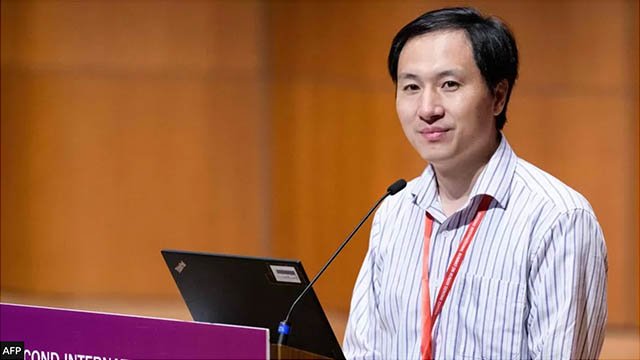I want to comment on the fact that the scientist in China who genetically engineered human fetuses has been sentenced to jail for three years. He Jiankui was globally condemned when he announced his experiments last November, fined about $430,000, fired from his job and is under close scrutiny by the government. Now they have sentenced him to three years and the court handed lower sentences to two men who conspired with him to carry out the experiments. The court said, “They’ve crossed the bottom line in ethics and scientific research and medical ethics.”’ The Chinese Academy of Scientists said, “Under certain under current circumstances, gene editing in human embryos still involves various unresolved technical issues, might lead to unforeseen risks and violate and violates the consensus of the international scientific community.”
I just want to first point out that he actually got the research wrong. There’s a particular gene that has a particular mutation that can prevent HIV. So he went in and targeted that gene. First of all, he recruited seven heterosexual couples who wanted children where the men had HIV and the women did not. Then, using a gene editing technique called CRISPR CAS 9, he targeted the gene CCR5. And when he finally published the research, it turns out he did it wrong or the CRISPR did not work correctly and it wasn’t the same mutation that happens naturally, which results in immunity to HIV. Instead, it resulted in a new previously unseen edit. As Professor Robin Lovell-Badge from the UK Sir Francis Crick Institute said, “There have never been any studies on these specific mutations because they haven’t existed before. He was very foolish. He thought he knew better, but the techniques are just not there yet to do genome editing safely and efficiently.”
We know that gene editing is not sufficiently developed to do predictable and safe gene mutations on humans, but we also know that it’s not predictable and safe to do gene editing on anything without the possibility of unpredicted side effects. What had people up in arms was that this was what’s called germline gene editing, meaning that the transformation he created would be inherited by the offspring and the offspring’s offspring, etc… In other words, it becomes a permanent part of the human gene pool and that’s what got everyone excited.
The secondary point was it didn’t work properly. Here’s the interesting thing: the Chinese Academy of Sciences says, “The gene editing in human embryos involves unresolved technical issues, leading to unforeseen risks, and violates the consensus of the international scientific community.”
My question is – what about gene editing everything else in nature: bacteria, fungus, algae, bees, trees, animals, fish? Everything else is up for grabs and it’s not safe and predictable. It does lead to unpredicted side effects and becomes a permanent part of the gene pool. This is kind of like a leftover of the old European view of nature as something to be subdued, managed and manipulated at the whims of humans. We are now learning, with all the changes that we’ve made in the environment and how it’s come back to bite us, that we live as part of an ecosystem. And so the global outrage that occurred after this scientist announced that he had edited the genome for humans has been silent related to the editing of all other creatures, which is going on now.
We’ve been working to help alert people to this discrepancy so that we protect nature. And if you’d like to see a three-minute film about that, go to protectnaturenow.com.
Safe Eating,
Jeffrey Smith


